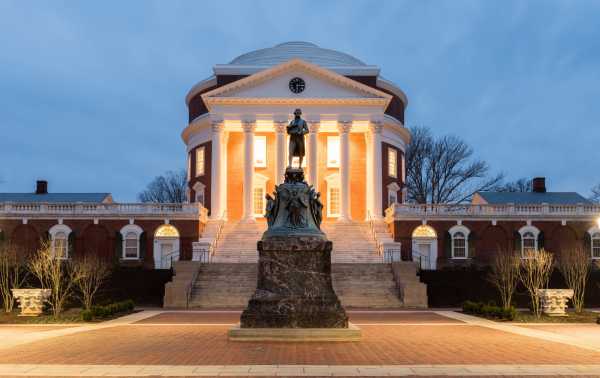
As University of Virginia students return to grounds this year, they will yet again be reminded of what they love about their school. Unfortunately, they must also confront an oppressive, self-hating mindset that has pervaded many of its institutions, including the student newspaper.
Last month, on the anniversary of the “Unite the Right” rally, the Cavalier Daily published an editorial demanding that the University take further action to “create citizen leaders” by “reforming both student education and the physical environment of Grounds.” In the first place, they call for “mandatory and continuous education” about Charlottesville and university history. While in itself this may not seem objectionable, the authors only highlight the most negative moments of this history. They refer to the university’s “racist roots” as well as subsequent racist incidents, many of which are only tangentially connected to the university.
Advertisement
Thomas Jefferson does not bear responsibility for the actions of the Ku Klux Klan, simply because they met at his tomb nearly a century after his death. Nor does the University of Virginia bear blame for the “Unite the Right” demonstration because some of its organizers happen to be among the thousands of the school’s alumni. Any history curriculum should take account of the totality of its subjects, not present its elements in a transparently slanted manner. It is also difficult to see how subjecting students from moment they arrive to ideologically driven scolding about how UVA is a horribly racist place will make them better citizen leaders.
Their second demand has even more radical implications. “Our physical environment — from statues to building names to Jefferson’s overwhelming presence — exalts people who held the same beliefs as the repugnant white supremacists in attendance at the ‘Unite the Right’ rally. These buildings must be renamed and memorials removed.” This call to remove memorials to Jefferson did not emerge in a vacuum.
Many statues have recently been removed both at UVA and in the city of Charlottesville. Jefferson himself has also fallen victim to the most recent wave of anti-racist iconoclasm in other parts of the country. Yet in this case it is all the more stunning, given that Jefferson founded the university.
The word choice here is ominous, as the authors refer to Jefferson’s “presence,” in addition to specific statues and buildings. As founder and architect of the school, Jefferson’s presence pervades the entirety of grounds. Eradicating his presence at UVA would mean nothing less than leveling the Lawn and setting the Rotunda ablaze. And indeed, if Jefferson is morally equivalent to hateful, swastika-flying agitators, why shouldn’t we pursue this course of action?
The physical environment of UVA is not a shameful symbol of past or current oppression. The Lawn remains one of the most beautiful and distinctive architectural achievements of American, and indeed, world history. The design of Jefferson’s “academical village” also reflected his academic ideals, with students and professors living and learning closely together among buildings modeled after classical ideals of harmony and proportion. It was designed to incubate republican virtue, by cultivating true “citizen leaders,” who would rise to self-governance through education. To this end, Jefferson stated that UVA would be “based on the illimitable freedom of the human mind.”
Advertisement
In both its physical layout and guiding principles, Jefferson aimed to create a university that would enlighten the mind and ennoble the soul. While the university has changed since Jefferson’s day, these ideals continue to be the school’s animating ethos. These ideals have also come under attack, on the grounds that they are merely a means of perpetuating racism. Even as the authors forcefully denounce the “Unite the Right” marchers, they ironically seem to have arrived at the same conclusion: that figures such as Jefferson are only significant inasmuch as they supported white supremacy, and that all their other achievements are inextricably linked with their support of those ideas.
Taken together, the revolutionary meaning of these demands becomes clear: our collective memory of the past and its heroes must be wiped out and replaced with a history premised on guilt for past injustices and resentment towards our ancestors. Since the early 2010s, there has been an effort to remove monuments and rename buildings in the name of cleansing the public square of racism. While initially presented as an effort to remove controversial figures such as Confederate generals, it has swiftly shifted to attacking all those who have failed to conform to present-day progressive morality.
These efforts amount to a totalizing deconstruction of American political mythology. This leveling impulse seems to have no limit, and will not be satisfied until all references to the American founding and its legacy are erased. Yet it is this legacy, which lives on in disparate forms—from street names to statues to the Lawn itself—that gives shape and color to daily life. Removing these references to the past would leave us without any culture or distinct self-understanding. To paraphrase Tacitus, they would make a desert and call it equity.
Subscribe Today Get weekly emails in your inbox Email Address:
These demands show a strong sense of injustice, but there is little recognition of the moral complexity of the past and the inherent tragedy of the human condition. While it is important to understand historical figures in their totality, this also means that these figures cannot be assessed solely on the basis of their worst qualities.
If we hope for forgiveness and grace from future generations for our own inevitable mistakes, we must be willing to honor the virtues of our ancestors, despite their moral failings. This what the ancient Romans termed pietas, the duty to revere one’s country, and especially one’s ancestors. It is this reverence for the past that binds people together, and gives them an inheritance they will fight to preserve and for which they will sacrifice.
A man such as Thomas Jefferson, who was essential in the founding of both the United States and the University of Virginia, deserves this reverence, especially from students who attend his university. If we are not willing to preserve Jefferson’s memory, we are not worthy of his legacy.
Advertisement
Sourse: theamericanconservative.com






